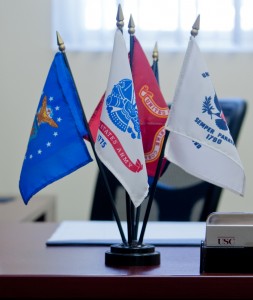Panel discusses veterans on campus
To help illustrate the difficulties that military service members face when returning to universities after combat, The Soldiers Project hosted the Combat to Campus panel at the Davidson Conference Center on Saturday.
The Soldiers Project is a non-profit organization that offers free confidential psychological counseling to military service members and their families.

Service · A panel Saturday focused on the transition to college for military veterans. The discussion was part of a weekend conference. - Adrian Hoffman | Summer Trojan
Many soldiers face several physical and psychological effects after returning from their term of service, said Gail Soffer, the development director of The Soldiers Project.
“A lot of these people are suffering from traumatic brain injuries and major issues that make it difficult to pay attention or stay awake in class because they are sleep deprived,” Soffer said. “[Returning veterans] also have to deal with bureaucracy, which can be difficult since they are used to a chain of command that’s very straightforward, and a university has a very different way of operating.”
Patricia D’Orange-Martin, a speaker at the panel and the coordinator of the Veterans Resource Center at Pasadena City College, said veteran affairs are particularly important in Los Angeles and California as a whole because the state has some of the largest populations of veterans in the United States.
“It’s estimated that California has 2.2 million veterans residing here, and is the top state in the nation for the number of veterans that live here,” D’Orange-Martin said. “According to the California Department of Veterans Affairs, there’s between 60,000 and 70,000 veterans in higher education.”
Soffer said many universities should offer more services to veterans to facilitate their return and encourage their talents in the classroom.
“[TSP] should offer training for faculty and staff because they may see a student falling asleep in class or looking around in class, and they just need to understand the context for why they are behaving this way,” Soffer said. “They also shouldn’t treat [veterans] like killers or glorified heroes, but instead just like normal people,” Soffer said.
Ian Smith, a Marine veteran and music education major at California State University Northridge, said at the panel that one of the problems that many veterans face when returning to a university is their lack of pride in being a soldier.
“Up until [arriving at college], I had no interest in being involved in anything veteran, and I didn’t even like being called a veteran,” Smith said. “When someone called me a veteran of a foreign war for the first time, it [was] almost like they said something about my mom. I have these images of a veteran, like the homeless guy off the side of the freeway with a cardboard sign, and that just wasn’t me.”
